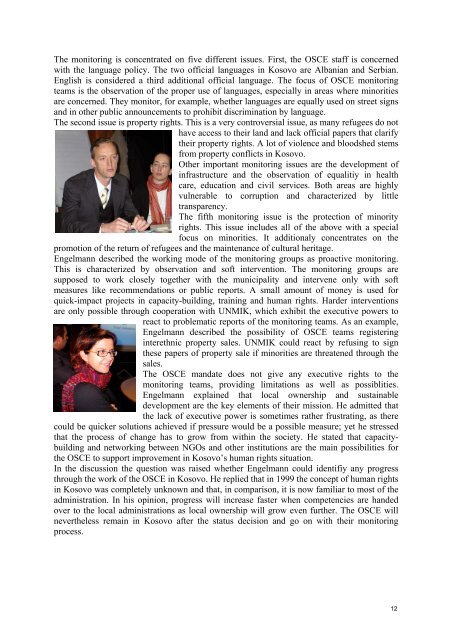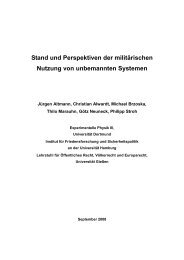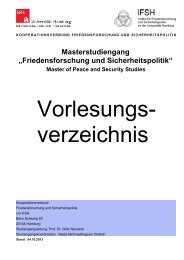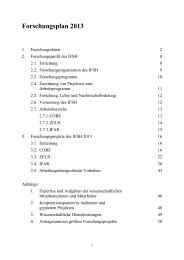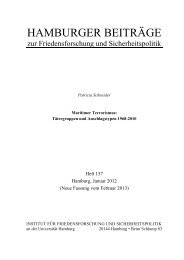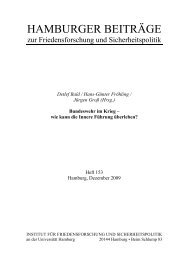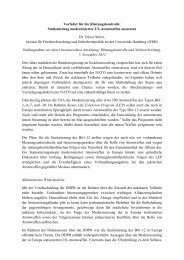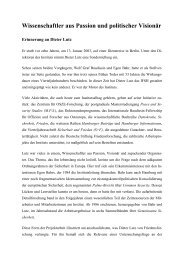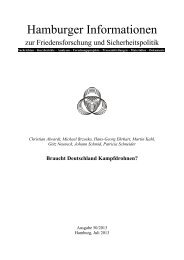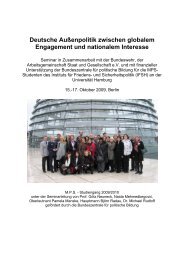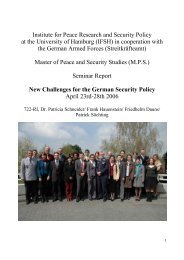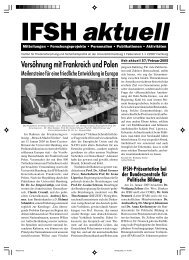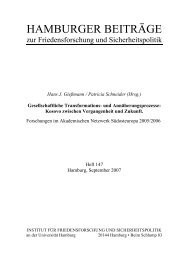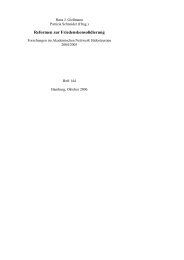Minority Rights Protection and Human Rights Policies in ... - IFSH
Minority Rights Protection and Human Rights Policies in ... - IFSH
Minority Rights Protection and Human Rights Policies in ... - IFSH
You also want an ePaper? Increase the reach of your titles
YUMPU automatically turns print PDFs into web optimized ePapers that Google loves.
The monitor<strong>in</strong>g is concentrated on five different issues. First, the OSCE staff is concerned<br />
with the language policy. The two official languages <strong>in</strong> Kosovo are Albanian <strong>and</strong> Serbian.<br />
English is considered a third additional official language. The focus of OSCE monitor<strong>in</strong>g<br />
teams is the observation of the proper use of languages, especially <strong>in</strong> areas where m<strong>in</strong>orities<br />
are concerned. They monitor, for example, whether languages are equally used on street signs<br />
<strong>and</strong> <strong>in</strong> other public announcements to prohibit discrim<strong>in</strong>ation by language.<br />
The second issue is property rights. This is a very controversial issue, as many refugees do not<br />
have access to their l<strong>and</strong> <strong>and</strong> lack official papers that clarify<br />
their property rights. A lot of violence <strong>and</strong> bloodshed stems<br />
from property conflicts <strong>in</strong> Kosovo.<br />
Other important monitor<strong>in</strong>g issues are the development of<br />
<strong>in</strong>frastructure <strong>and</strong> the observation of equalitiy <strong>in</strong> health<br />
care, education <strong>and</strong> civil services. Both areas are highly<br />
vulnerable to corruption <strong>and</strong> characterized by little<br />
transparency.<br />
The fifth monitor<strong>in</strong>g issue is the protection of m<strong>in</strong>ority<br />
rights. This issue <strong>in</strong>cludes all of the above with a special<br />
focus on m<strong>in</strong>orities. It additionaly concentrates on the<br />
promotion of the return of refugees <strong>and</strong> the ma<strong>in</strong>tenance of cultural heritage.<br />
Engelmann described the work<strong>in</strong>g mode of the monitor<strong>in</strong>g groups as proactive monitor<strong>in</strong>g.<br />
This is characterized by observation <strong>and</strong> soft <strong>in</strong>tervention. The monitor<strong>in</strong>g groups are<br />
supposed to work closely together with the municipality <strong>and</strong> <strong>in</strong>tervene only with soft<br />
measures like recommendations or public reports. A small amount of money is used for<br />
quick-impact projects <strong>in</strong> capacity-build<strong>in</strong>g, tra<strong>in</strong><strong>in</strong>g <strong>and</strong> human rights. Harder <strong>in</strong>terventions<br />
are only possible through cooperation with UNMIK, which exhibit the executive powers to<br />
react to problematic reports of the monitor<strong>in</strong>g teams. As an example,<br />
Engelmann described the possibility of OSCE teams register<strong>in</strong>g<br />
<strong>in</strong>terethnic property sales. UNMIK could react by refus<strong>in</strong>g to sign<br />
these papers of property sale if m<strong>in</strong>orities are threatened through the<br />
sales.<br />
The OSCE m<strong>and</strong>ate does not give any executive rights to the<br />
monitor<strong>in</strong>g teams, provid<strong>in</strong>g limitations as well as possiblities.<br />
Engelmann expla<strong>in</strong>ed that local ownership <strong>and</strong> susta<strong>in</strong>able<br />
development are the key elements of their mission. He admitted that<br />
the lack of executive power is sometimes rather frustrat<strong>in</strong>g, as there<br />
could be quicker solutions achieved if pressure would be a possible measure; yet he stressed<br />
that the process of change has to grow from with<strong>in</strong> the society. He stated that capacitybuild<strong>in</strong>g<br />
<strong>and</strong> network<strong>in</strong>g between NGOs <strong>and</strong> other <strong>in</strong>stitutions are the ma<strong>in</strong> possibilities for<br />
the OSCE to support improvement <strong>in</strong> Kosovo’s human rights situation.<br />
In the discussion the question was raised whether Engelmann could identifiy any progress<br />
through the work of the OSCE <strong>in</strong> Kosovo. He replied that <strong>in</strong> 1999 the concept of human rights<br />
<strong>in</strong> Kosovo was completely unknown <strong>and</strong> that, <strong>in</strong> comparison, it is now familiar to most of the<br />
adm<strong>in</strong>istration. In his op<strong>in</strong>ion, progress will <strong>in</strong>crease faster when competencies are h<strong>and</strong>ed<br />
over to the local adm<strong>in</strong>istrations as local ownership will grow even further. The OSCE will<br />
nevertheless rema<strong>in</strong> <strong>in</strong> Kosovo after the status decision <strong>and</strong> go on with their monitor<strong>in</strong>g<br />
process.<br />
12


